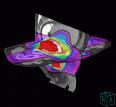
Advanced Rradiation Centers
March 18, 2009 - Cryosurgery produces clinical outcomes similar to those from external beam radiation therapy in localized prostate cancer at three years, but may be more beneficial with longer follow-up, according to a study sponsored by the Alberta Cancer Board and the National Cancer Institute of Canada.
Cryosurgery is a minimally invasive therapy that involves inserting probes into the prostate to generate subzero temperatures and induce apoptosis and secondary necrosis in cancerous cells. Short-term results and quality-of-life data have been comparable with those of other treatment modalities, but long-term effectiveness is not fully known.
The current study randomized 244 men in a 1:1 ratio to cryosurgery or external beam radiation therapy (EBRT), with a median follow-up of 100 months (range, 65-128 months). In all, 231 men received treatment.
Seven of 91 men (7.7 percent) treated with cryosurgery were biopsy positive for recurrence at 36 months, compared with 22 of 76 (29 percent) treated with radiotherapy.
It is not exactly clear why cryosurgery may produce better outcomes over time, said Bryan J. Donnelly, M.D., a urologist with the Tom Baker Cancer Centre in Calgary, Canada.
"It may be that there are some residual cells left in the prostate after radiation, whereas cryotherapy is more ablative up front," he said. "Another possibility, and there is increasing evidence, is that cryotherapy induces a cryoimmune response."
The panel also noted that gland size is a factor; the larger the gland, the more difficult it is to attain a uniformly low temperature. A prior history of transurethral resection of the prostate is a relative contraindication for cryosurgery. High-risk patients may require multimodal therapy.
The study excluded patients with bulky T3 disease or a PSA greater than 20 ng/mL. Two-thirds of patients had a Gleason score of 7 or higher, as staged by biopsy. Their mean age was 69 years. The first third of patients in the radiotherapy arm received 68 Gy before the dose was increased to 73.5 Gy. Neoadjuvant hormone therapy was extended from 3 to 6 months.
The definition of biochemical failure used in clinical trials changed three times during the study period, and low accrual resulted in the trial's being underpowered. Nine patients were lost to follow-up, 10 died from prostate cancer, and 23 died from other causes.
Using 14 different evaluation tools, there was no significant difference in quality of life between the two arms, said Dr. Donnelly at the meeting, which was sponsored by the American Society of Clinical Oncology, the American Society for Therapeutic Radiology and Oncology, and the Society of Urologic Oncology. At 36 months, 29.1 percent of men in the cryotherapy arm and 29.8 percent of men in the radiotherapy arm reported having sexual intercourse in the previous two months, although more men in the cryosurgery arm required aids.
Source: www.oncologystat.com
For more information: www.oncologystat.com


 January 30, 2026
January 30, 2026 









